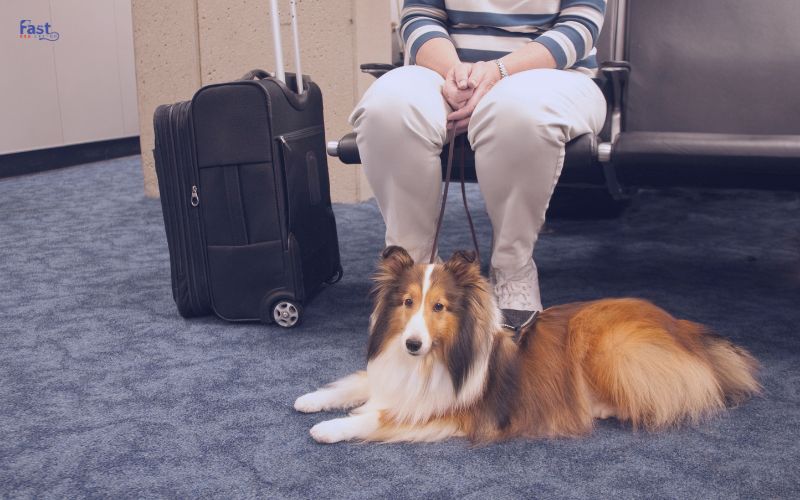What Should You Know About Emotional Support Animal Laws in Louisiana?

Robert Clendenin, MD
If you have an Emotional Support Animal (ESA) or are considering one in Louisiana, understanding the legal protections and responsibilities associated with ESAs is essential. ESA laws are designed to help individuals who rely on their animals for emotional assistance while respecting the rights of landlords, businesses, and the broader community. Moreover, familiarity with Louisiana emotional support animal laws isn’t just about following rules; it’s about ensuring fair treatment and preventing misunderstandings or penalties.
This guide addresses the key aspects of emotional support animal regulations in Louisiana. Whether you’re seeking housing accommodations, curious about entry to public places, or planning travel with your ESA, knowing the core regulations can help protect your rights and ensure mutual respect within your community.

What is an Emotional Support Animal (ESA)?
An Emotional Support Animal (ESA) is more than just a pet; it is a companion that provides therapeutic benefits to individuals with mental or emotional conditions. Unlike service animals, ESAs do not require specialized training to perform specific tasks. Instead, their primary role is to offer comfort, reduce anxiety, and improve the overall emotional well-being of their owners. ESAs can be any type of animal, including dogs, cats, birds, and even reptiles, making them versatile companions for those in need.

To qualify for an ESA, an individual must have a legitimate mental or emotional condition, such as anxiety, depression, or post-traumatic stress disorder (PTSD). This qualification must be documented by a licensed mental health professional who can provide a valid ESA letter. This letter is crucial as it officially recognizes the animal’s role in the individual’s mental health treatment plan, ensuring that the ESA is not merely a pet but a vital component of their emotional support system.
Key Points
- Fair Housing Act (FHA) Protections: The state follows federal laws such as the Fair Housing Act, which gives individuals the right to request reasonable accommodations for their ESAs in housing that typically prohibits pets.
- No Pet Fees for ESAs: Under the FHA, landlords cannot impose pet fees or pet rent on tenants with an ESA. However, tenants remain responsible for any property damage caused by their animals.
- Air Travel Protections: Airlines are not required to permit ESAs to travel in the cabin with their owners under the Air Carrier Access Act.
- Not Permitted in Public Places: Unlike service animals, emotional support animals are not granted automatic entry to public places. Public establishments like restaurants and stores are not legally obligated to allow ESAs unless they choose to do so.
- Landlords’ Right to Request Documentation: Landlords may request a Louisiana ESA letter. This letter must confirm the animal’s role in alleviating symptoms of a mental health condition, but landlords cannot demand further medical information.
Louisiana’s ESA Law: (HB-407)
- ESA Documentation: Individuals must obtain ESA letters from licensed state healthcare providers who have established a relationship with the client for at least 30 days, similar to regulations in Montana and California.
- Penalties for Fraud: Misrepresenting a pet as a service or support animal now carries significant consequences to prevent misuse and maintain the integrity of legitimate service animals.
- Transparency for Sellers: Those selling emotional support animals must provide accurate and upfront information to buyers, ensuring ethical practices.
- Landlord-Tenant Clarity: HB-407 clarifies rights and responsibilities, balancing the needs of tenants with ESAs and concerns about potential abuse.
Getting an ESA Letter in Louisiana
Obtaining an ESA letter in Louisiana is a straightforward process that begins with consulting a licensed mental health professional. This professional must be authorized to practice in the state and can be found through online searches or referrals from friends and family. During the consultation, the mental health professional will assess your mental health needs and determine whether an ESA is an appropriate part of your treatment plan.
If the professional concludes that an ESA is necessary, they will issue a valid ESA letter. This letter must meet the requirements of the FHA, which protects individuals with mental and emotional health conditions from housing discrimination. It is important to note that ESA letters must be renewed annually to remain valid. This ensures that the need for the ESA is still relevant and that the documentation is up-to-date.
What are Housing Laws for Emotional Support Animals in Louisiana Under the FHA?
In Louisiana, emotional support animal regulations align with the federal Fair Housing Act (FHA), requiring landlords to provide reasonable accommodations for tenants who need emotional support animals. Although Louisiana does not have state-specific housing laws for ESAs, federal guidelines under the FHA apply statewide, ensuring ESA owners are protected from housing discrimination.
Tenant Requirements for ESA Requests
- Have a Qualifying Disability
The tenant must have a documented emotional or psychological condition, such as stress, anxiety, or depression. - Provide Official Documentation
The tenant must present a letter from a licensed mental health professional verifying the need for an ESA to manage their condition.
What Counts as “Reasonable Accommodation”?
- Allowing the ESA on the Property
Landlords cannot deny housing to an ESA owner even if the property has a strict “no pets” policy. - Waiving Pet Fees and Restrictions
As ESAs are not classified as pets under the FHA, landlords are prohibited from charging pet fees, deposits, or enforcing breed/size restrictions.
However, accommodations must not impose an undue financial or administrative burden on the landlord. If an ESA poses a direct risk or causes significant property damage, the landlord may have grounds to deny the request.
Limits on Landlord Rights
- No Pet Fees or Additional Deposits
Since ESAs aren’t considered pets, landlords cannot impose pet-related fees or deposits. - No Size or Breed Restrictions
Standard pet policies for size or breed do not apply to ESAs. - Basic Documentation Only
Landlords can request a letter from a healthcare provider to confirm the tenant’s need for an ESA, but they cannot ask for further details about the tenant’s specific condition.
When Can a Landlord Legally Deny an ESA?
- The ESA Poses a Direct Threat
If the ESA has a documented history of aggressive behavior that could be a risk, the landlord may deny the request. - Undue Burden
If accommodating the ESA would impose a substantial financial or operational burden on the landlord, they may have grounds for denial. - Property Damage
If the ESA has caused substantial property damage previously, the landlord may be able to refuse the accommodation.
Special Situations and Exemptions
- Owner-Occupied Small Rentals
If a property has four or fewer units and the landlord lives in one, they are not subject to FHA rules and can legally deny an ESA request. - Single-Family Homes Rented Without a Broker
Landlords renting a single-family home without the use of a real estate broker are exempt from FHA obligations regarding ESAs.
Tenant Options if an ESA Request is Denied
- Communicate with the Landlord
Sometimes, clearing up misunderstandings or providing clearer information about the ESA can resolve issues. - File a Complaint
Tenants can file a complaint with the U.S. Department of Housing and Urban Development (HUD), which investigates potential discrimination cases under the FHA. - Seek Legal Assistance
Consulting with a legal professional can help clarify tenant rights and guide tenants through the next steps if they believe their housing rights were violated.
Can ESAs Accompany Their Owners in Public Places in Louisiana?

However, ESAs are not covered under these protections. It is important to understand the differences between service dogs and emotional support animals.
Here’s an overview of public place policies with an ESA in Louisiana.
Public Places (Restaurants, Retail Stores, etc.)
- Entry Limitations: ESAs generally do not have the right to enter public places such as restaurants, retail stores, theaters, or other establishments open to the public. Under the ADA, only service animals are allowed in these areas.
- Business Discretion: Individual businesses may choose to allow ESAs, but they are not legally required to do so. Some businesses may accommodate ESAs for customer service reasons, but this decision is voluntary.
- State Parks and Public Areas: Louisiana state parks and other public spaces generally do not grant entry to ESAs. If you plan to visit a public area or attend an event, it’s recommended to contact the venue in advance to check their ESA policy.
Can ESAs Accompany Their Owners in Workplaces in Louisiana?

- No Automatic Right to Bring ESAs to Work: ESAs do not have automatic entry to workplaces under the ADA. No Louisiana ESA laws grant ESAs the right to accompany their owners in employment settings.
- Accommodation Requests: Employees with disabilities can request to bring an ESA to work as a reasonable accommodation. However, the employer has discretion in determining if allowing the ESA is feasible based on the work environment. Factors like job nature, workspace type, potential disruptions, and accommodation feasibility are considered in this decision.
- Employer Rights: Employers are not obligated to allow ESAs if they determine that doing so would cause undue hardship or disrupt the workplace. In such cases, they may suggest alternative accommodations to meet the employee’s needs without impacting the work environment.
What Are Traveling Laws with an ESA in Louisiana?

1. Air Travel: Rules for ESAs Under the Air Carrier Access Act
The Air Carrier Access Act (ACAA) was created to prevent discrimination against individuals with disabilities in air travel, including those relying on ESAs.
- ESA Acceptance by Airlines: Airlines classify ESAs as pets, charging additional pet fees and imposing restrictions on size, breed, and seating arrangements. Therefore, ESA owners should check specific pet policies for each airline.
- Documentation Requirements: Airlines often require ESA owners to provide documentation prior to flying, including:
- A letter from a licensed healthcare provider confirming that the ESA is needed for the owner’s emotional support.
- Some airlines may also ask for additional documents regarding the ESA’s vaccination, health status, and behavior.
- Airline-Specific Policies: Each airline may have its own policy on ESAs. Some allow ESAs under limited conditions. ESA owners should contact the airline in advance to confirm the ESA policy and prepare required documentation.
2. Travel by Train or Bus
- Amtrak: Amtrak permits ESAs on board under specific conditions. Passengers must present a Louisiana ESA letter stating the need for the ESA. Amtrak may have restrictions on the ESA’s size and behavior.
- Greyhound and Other Bus Lines: Greyhound generally does not permit ESAs, allowing only small pets in carriers. Passengers should check with individual bus providers to determine if they offer any exceptions for ESAs.
What Are College and School Rules Regarding ESAs in Louisiana?

1. College and University Rules Regarding ESAs
- Fair Housing Act (FHA) Protections: While ESAs are not allowed throughout college campuses, students residing in on-campus housing can request ESA accommodations under the FHA. If a student can demonstrate that an ESA is necessary to manage their condition, the university is obligated to consider requests—even in “no pets” housing policies.
- Documentation Requirements: Colleges and universities typically require documentation from a mental health professional, such as a psychologist or psychiatrist, confirming the student’s condition and explaining how the ESA supports their emotional well-being.
- Living Conditions and ESA Guidelines: If approved, universities may establish guidelines, such as ensuring the ESA is well-behaved, poses no threat to others, and does not damage university property. Some schools may also have size or breed restrictions and require vaccination or health records for the ESA.
2. K-12 Schools Rules Regarding ESAs in Louisiana
- Not Permitted in Public Areas: In Louisiana K-12 schools, ESAs, such as service animals, are prohibited in public areas. Federal law mandates reasonable accommodations for students with disabilities, but this does not typically include ESAs in classrooms.
- Requesting an ESA Accommodation: Parents or guardians can request an ESA as part of the student’s accommodation plan, typically under a Section 504 Plan or Individualized Education Plan (IEP). The school’s team will assess if the ESA is necessary for supporting the student’s academic and social needs.
- Teacher and School Discretion: Schools are required to offer reasonable accommodations, but they are not obliged to allow ESAs if doing so would lead to significant disruption or safety risks. Schools may consider options like allowing the ESA only in private or designated settings, if appropriate.
ESA and Financial Assistance
Moreover, some employers may offer accommodations or benefits for employees with ESAs. These can include flexible work arrangements or mental health days, acknowledging the positive impact an ESA can have on an employee’s well-being and productivity.
If you are an ESA owner in Louisiana, it is worthwhile to explore these options to determine if you qualify for any financial assistance or accommodations that can support you and your ESA.
By understanding and utilizing these resources, ESA owners can better manage the financial responsibilities of caring for their emotional support animals, ensuring that both the owner and the animal can thrive.
What Are The Common Misconceptions About ESA Laws in Louisiana?
- ESAs Are the Same as Service Animals
- Misconception: ESAs have the same rights as service dogs.
- Reality: Service dogs are protected under ADA and the FHA, giving them rights in public places and housing. In contrast, ESAs are only protected under the FHA, so they have housing rights but not unrestricted entry to public places.
- ESAs Are Allowed Everywhere
- Misconception: ESAs have unrestricted allowance to all public spaces.
- Reality: ESAs do not have unrestricted allowances for public places like restaurants, stores, and public transportation. Their rights are limited primarily to housing under the FHA, and entry to other places is typically at the discretion of the business or venue.
- Anyone Can Claim an ESA
- Misconception: Anyone can label their pet as an ESA without genuine need.
- Reality: ESAs require proper documentation from a licensed mental health professional verifying the need for emotional support. Falsely claiming a pet as an ESA is illegal and subject to penalties.
- Landlords Can Deny ESAs Without Explanation
- Misconception: Landlords can deny an ESA request based on a “no pets” policy.
- Reality: Landlords cannot deny an ESA request arbitrarily. They must have a valid reason, such as concerns about safety or property damage. When a denial is allowed, the landlord must provide a reason for it, as a “no pets” policy alone is insufficient grounds for denying an ESA.
- ESAs Are Always Covered by the ADA
- Misconception: ESAs are protected under the ADA and have public access rights.
- Reality: The ADA only covers service animals, not ESAs. ESAs are protected primarily under the Fair Housing Act, which allows individuals to keep them in housing, but public access rights for ESAs are not guaranteed.
- You Can Keep an ESA Without Any Documentation
- Misconception: ESA owners do not need documentation.
- Reality: A valid ESA letter from a licensed healthcare provider is essential, particularly in housing situations where landlords are legally entitled to request it. Legal protections are only granted when proper documentation is in place.
Bottom Line
In Louisiana, emotional support animals (ESAs) are primarily protected under the federal Fair Housing Act (FHA), rather than state-specific laws. The FHA provides ESA owners with housing accommodations such as waived pet fees and exemptions from pet restrictions, including breed, size, and weight limitations.
ESAs, however, do not have public access rights under the Americans with Disabilities Act (ADA), meaning they aren’t automatically allowed in public spaces. With a valid Louisiana ESA letter, you can request accommodations, though permission is at the discretion of the property owner or business, who may allow your ESA.
Frequently Asked Questions
Can My ESA Live With Me In Rental Housing In Louisiana?
Yes. Under the FHA, you have the right to keep your ESA in housing that normally doesn’t allow pets, provided you have documentation of your need for an ESA. Your landlord can request fair accommodations for verification.
Can My Landlord Ask For My ESA Letter In Louisiana?
Yes. Landlords may request a letter from a licensed mental health professional verifying your need for an ESA, but they cannot ask for detailed medical records or other personal health information.
Are There Any Specific Louisiana Laws For ESA Housing?
Can My ESA Be Removed From My Home In Louisiana?
Yes. An ESA may be removed if it poses a direct threat to the safety of others or causes significant damage. The landlord must document the reason for removal and provide notice to the tenant.
Can I Have More Than One ESA In Louisiana?
Yes, you may have multiple ESAs if they are necessary for your mental health. However, landlords may request documentation for each ESA and could have policies that limit the number of animals.
What Are The Penalties For Not Complying With ESA Laws In Louisiana?
Post Author
Prince Sharma
Related Articles
What Are the Emotional Support Animal Laws in Kansas?
What Are the Emotional Support Animal Laws in Kansas?In Kansas, emotional support animals (ESAs) are protected under federal laws like the Fair Housing Act, which allows them in housing without pet fees, even in no-pet policies. However, ESAs are not...
What Are the Emotional Support Animal Laws in Nebraska?
What Are the Emotional Support Animal Laws in Nebraska?In Nebraska, emotional support animals (ESAs) are protected under federal laws like the Fair Housing Act, which allows them in housing without pet fees, even in no-pet policies. However, ESAs are...
What Are the Emotional Support Animal Laws in Wyoming?
What Are the Emotional Support Animal Laws in Wyoming?In Wyoming, emotional support animals (ESAs) are protected under federal laws like the Fair Housing Act, which allows them in housing without pet fees, even in no-pet policies. However, ESAs are...
Live Free with Your ESA!
An ESA Letter Unlocks Freedom!





